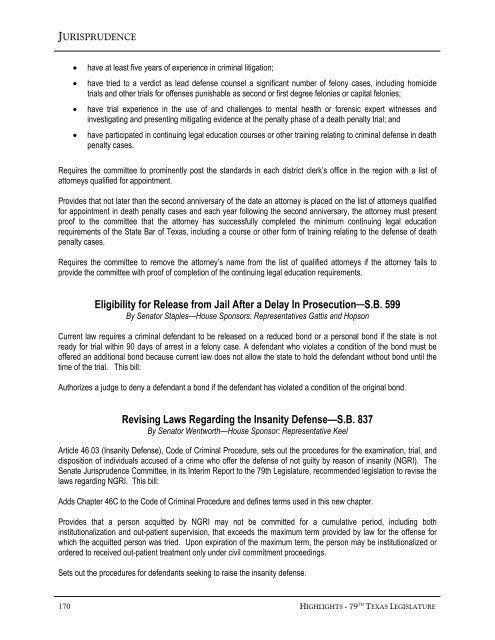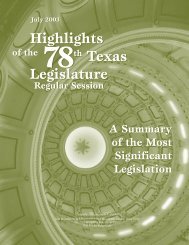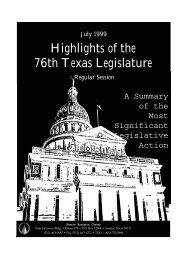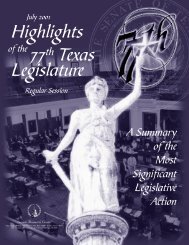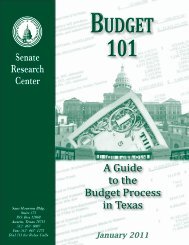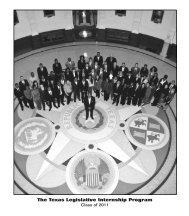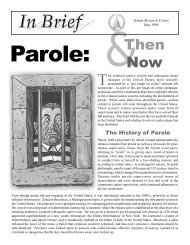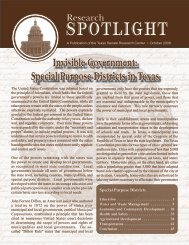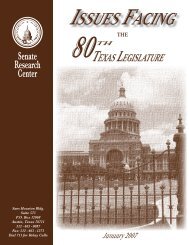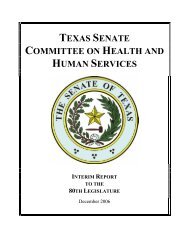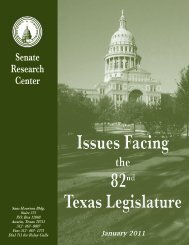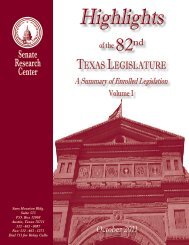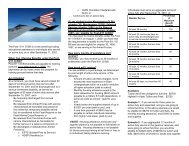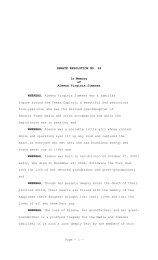Highlights of the 79th Texas Legislature - Senate
Highlights of the 79th Texas Legislature - Senate
Highlights of the 79th Texas Legislature - Senate
Create successful ePaper yourself
Turn your PDF publications into a flip-book with our unique Google optimized e-Paper software.
JURISPRUDENCE<br />
• have at least five years <strong>of</strong> experience in criminal litigation;<br />
• have tried to a verdict as lead defense counsel a significant number <strong>of</strong> felony cases, including homicide<br />
trials and o<strong>the</strong>r trials for <strong>of</strong>fenses punishable as second or first degree felonies or capital felonies;<br />
• have trial experience in <strong>the</strong> use <strong>of</strong> and challenges to mental health or forensic expert witnesses and<br />
investigating and presenting mitigating evidence at <strong>the</strong> penalty phase <strong>of</strong> a death penalty trial; and<br />
• have participated in continuing legal education courses or o<strong>the</strong>r training relating to criminal defense in death<br />
penalty cases.<br />
Requires <strong>the</strong> committee to prominently post <strong>the</strong> standards in each district clerk’s <strong>of</strong>fice in <strong>the</strong> region with a list <strong>of</strong><br />
attorneys qualified for appointment.<br />
Provides that not later than <strong>the</strong> second anniversary <strong>of</strong> <strong>the</strong> date an attorney is placed on <strong>the</strong> list <strong>of</strong> attorneys qualified<br />
for appointment in death penalty cases and each year following <strong>the</strong> second anniversary, <strong>the</strong> attorney must present<br />
pro<strong>of</strong> to <strong>the</strong> committee that <strong>the</strong> attorney has successfully completed <strong>the</strong> minimum continuing legal education<br />
requirements <strong>of</strong> <strong>the</strong> State Bar <strong>of</strong> <strong>Texas</strong>, including a course or o<strong>the</strong>r form <strong>of</strong> training relating to <strong>the</strong> defense <strong>of</strong> death<br />
penalty cases.<br />
Requires <strong>the</strong> committee to remove <strong>the</strong> attorney’s name from <strong>the</strong> list <strong>of</strong> qualified attorneys if <strong>the</strong> attorney fails to<br />
provide <strong>the</strong> committee with pro<strong>of</strong> <strong>of</strong> completion <strong>of</strong> <strong>the</strong> continuing legal education requirements.<br />
Eligibility for Release from Jail After a Delay In Prosecution─S.B. 599<br />
By Senator Staples—House Sponsors: Representatives Gattis and Hopson<br />
Current law requires a criminal defendant to be released on a reduced bond or a personal bond if <strong>the</strong> state is not<br />
ready for trial within 90 days <strong>of</strong> arrest in a felony case. A defendant who violates a condition <strong>of</strong> <strong>the</strong> bond must be<br />
<strong>of</strong>fered an additional bond because current law does not allow <strong>the</strong> state to hold <strong>the</strong> defendant without bond until <strong>the</strong><br />
time <strong>of</strong> <strong>the</strong> trial. This bill:<br />
Authorizes a judge to deny a defendant a bond if <strong>the</strong> defendant has violated a condition <strong>of</strong> <strong>the</strong> original bond.<br />
Revising Laws Regarding <strong>the</strong> Insanity Defense—S.B. 837<br />
By Senator Wentworth—House Sponsor: Representative Keel<br />
Article 46.03 (Insanity Defense), Code <strong>of</strong> Criminal Procedure, sets out <strong>the</strong> procedures for <strong>the</strong> examination, trial, and<br />
disposition <strong>of</strong> individuals accused <strong>of</strong> a crime who <strong>of</strong>fer <strong>the</strong> defense <strong>of</strong> not guilty by reason <strong>of</strong> insanity (NGRI). The<br />
<strong>Senate</strong> Jurisprudence Committee, in its Interim Report to <strong>the</strong> <strong>79th</strong> <strong>Legislature</strong>, recommended legislation to revise <strong>the</strong><br />
laws regarding NGRI. This bill:<br />
Adds Chapter 46C to <strong>the</strong> Code <strong>of</strong> Criminal Procedure and defines terms used in this new chapter.<br />
Provides that a person acquitted by NGRI may not be committed for a cumulative period, including both<br />
institutionalization and out-patient supervision, that exceeds <strong>the</strong> maximum term provided by law for <strong>the</strong> <strong>of</strong>fense for<br />
which <strong>the</strong> acquitted person was tried. Upon expiration <strong>of</strong> <strong>the</strong> maximum term, <strong>the</strong> person may be institutionalized or<br />
ordered to received out-patient treatment only under civil commitment proceedings.<br />
Sets out <strong>the</strong> procedures for defendants seeking to raise <strong>the</strong> insanity defense.<br />
170 HIGHLIGHTS - 79 TH TEXAS LEGISLATURE


